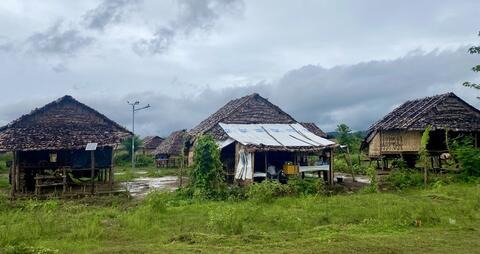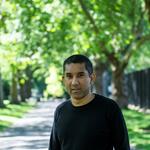Blog
Voices from the ground – protracted displacement economies
Many displaced people around the world are in limbo—unable to return home or go anywhere else. Our surveys show that displaced people have lived in their current location for 6.9 years on average, significantly longer than the five-year threshold for what is typically considered a ‘protracted’ displacement situation.
A woman living in Myaing Gyi Ngu, a camp for internally displaced persons in Myanmar, describes this sense of being stuck: ‘Our current settlement became our destination, as I could not move anywhere else since I moved here in 2016… I miss my village every day… I really want to go home, but I’m afraid of mines because numerous neighbours were killed by exploding mines in my village.’

On top of this, many displaced people suffer serious deprivation. According to the United Nations, nine out of ten Syrian refugees in Lebanon live in extreme poverty. As a Syrian man originally from Homs but now living in Tripoli, Lebanon says: ‘We have a very bad financial situation… I don’t have a fixed job and I’m currently not working. We don’t have water or electricity… We are unable to buy meat, oil, or milk.’
It does not have to be like this. It is possible for economies affected by displacement to flourish.
The concept of displacement-affected communities
However, an entirely different perspective is necessary. Rather than talking about people who are displaced and those who are not, it is far more helpful to think of displacement-affected communities. Such an approach sheds light on the complex nature of displacement. For example, a person from the ‘host’ community may have family members, close friends, or business partners who are displaced. In addition, thinking about displacement-affected communities cuts through divides and puts the focus on ensuring that all people, regardless of their background, can achieve their potential.
Dollo Ado, a district in south-eastern Ethiopia that borders Somalia, is rife with examples of successful collaboration between members of the ‘host’ community and Somali refugees. In 2018, an Ethiopian man was approached by a Somali refugee who proposed farming onions on a small portion of his land using irrigation agriculture (a technique introduced to the region by refugees). The refugee produced onions that fetched around ETB 600,000 (approximately USD 11,684 at the time)—a huge sum by local standards.
The Ethiopian man explains how this transformed his financial situation: ‘When I saw the land I gave him fetches that amount of money, I was taken by surprise, and now I am among the leading farmers. I purchased two water engines, and I am considering buying a car.’
A key idea underpinning the Global Compact on Refugees is the need to shift from short-term humanitarianism to longer-term development. If national governments and international donors support existing and new collaborations in displacement-affected communities, they can go a long way towards making this shift a reality. In particular, they should procure from local, social businesses and promote accountable, local financial institutions centered on nurturing small- and medium-sized enterprises. These measures can create decent jobs in areas affected by displacement (where, on average, only 25% have been employed in the last 12 months) and drive inclusive economic growth.
The importance of mutual aid and unpaid care
Yet, it is necessary to go even further than this. Much collaboration among members of displacement-affected communities goes uncounted, though it is no less economically important. For example, on average, 30% of our respondents in displacement-affected communities say they give or receive financial support and 40% give or receive non-financial support.
An Afghan man in the Pakistani city of Chitral gives an insight into the sort of non-financial support displaced people like him have received: ‘At the very beginning, they [Chitrali people] would offer us food when we came to the camps. But they have no money and limited resources so they could not offer much. We have taken their timber and grazed the grass and they have never objected to that… The locals… go with us to police stations for bail [a good character reference], if needed. Who else will do that for us? The locals are very kind.’
Unpaid care work is also extremely economically important, though again it is usually uncounted. On average, people in displacement-affected communities spend seven hours a day caring for those they live with. This work is disproportionately undertaken by women and girls. A Somali refugee girl in the Bole Mikael area of Ethiopia’s capital, Addis Ababa, explains that she dropped out of school to care for her unwell father: ‘I had to take that decision [dropping out of school] for my two brothers to continue their education.’
Therefore, a more comprehensive approach to understanding the nature of economies affected by displacement means paying far more attention to mutual aid and unpaid care work. In practice, this requires systematically measuring such activity, carefully listening to individuals and organizations who engage in it, and actively supporting them to succeed in ways that make entire systems of social protection and international assistance more effective.
It is already the case that forced displacement tends to improve the income, consumption, and wealth of ‘host’ communities in the Global South. Yet we are nowhere near realizing the economic potential of displacement-affected communities. Camps are not conducive to achieving this goal and should only ever be seen as a short-term response. As a Rwandan woman in Camp Mungote in North Kivu, Democratic Republic of Congo, says: ‘In the camp, it is always difficult to find a job to survive.’
Displaced people, like non-displaced people, need to be able to enjoy their rights, to work, to freedom of movement, and to all other human rights. This, along with strategic investment and a deeper appreciation of what represents economic activity, could truly transform displacement-affected communities.
Sunit Bagree is communications manager in the School of Global Studies at the University of Sussex and a member of the Protracted Displacement Economies team.
The views expressed in this piece are those of the author(s), and do not necessarily reflect the views of the Institute or the United Nations University, nor the programme/project donors.
 Join the network
Join the network
